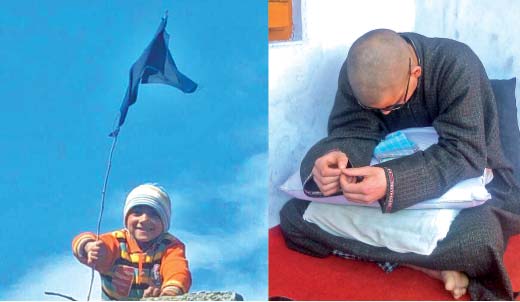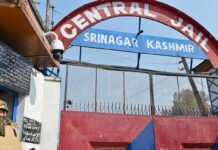Following the execution of 2001 Parliament Attack convict Afzal Guru, police and paramilitary forces have resorted to extreme use of pellet guns to deal with protestors in north Kashmir’s Baramulla town. Sameer Yasir meets a number of victims who have either partially lost vision or gone completely blind.

Javaid Ahmad Gojri, a sixteen-year-old resident of Khanpora in north Kashmir’s Baramulla, is visibly upset. A few days back, he tried to watch TV by keeping his right eye closed. It was not out of fun but a compulsion forced upon him by a recent turn of events. The experience of watching TV with one eye was frustrating and he broke down.
Javid, a laborer, left his studies at a young age and began helping his father who sells plastic boots in Baramulla Bus stand so that his three sisters could go to school. On February 10, a pellet hit Javaid in his right eye when he left his home to buy milk, a day after Afzal Guru, the 2001 Parliament Attack convict was secretly executed inside Tihar Jail in Delhi. A protest had broken out and Javaid unwillingly became a part of the protest.
His friends took him to a small hospital in Sheeri, some distance away from Baramulla town, fearing reprisal from police and paramilitary forces if he was taken to the main Baramulla hospital. The doctors in Sheeri referred Javaid back to Baramulla hospital and put him in an ambulance where a pregnant woman was lying on a stretcher.
“As the ambulance reached Khanpora bus stop, he was dragged out and beaten by police and CRPF. The driver of the ambulance was also beaten and stopped for almost an hour. When one of the attendants pleaded with police that there was a pregnant lady inside the ambulance, they let them go from where he was referred to Srinagar,” Javid’s mother, Saleema, told Kashmir life.
Before he was shifted to Sher-e-Kashmir Institute of Medical Sciences (SKIMS), a cousin of his mother kept him hidden under a bed in the maternity ward of Baramulla hospital to avoid police from arresting him. It took Javaid six hours to reach SKIMS in Srinagar where he was operated and his completely damaged eye ball was removed.
“His one eye was completely damaged. We couldn’t save it. The tiny pellets had spread inside the globe of his eye. There were very few chances of recovery. His eyeball was completely damaged,” Dr Sajad Ahmad, who carried out the surgery at SKIMS, said.
These days, a traumatized and visibly frustrated Javaid spends most of his time inside the four walls of his two storied house near Khanpora bus stand. Just fifteen meters away from his house, another resident of this tiny hamlet is going through treatment in Amritsar where doctors are trying to save his left eye. He too was hit by a pellet firced by paramilitary forces on protestors in Baramulla on February 13. His family, says a resident, could afford to take their son to Amritsar for specialized treatment, “Javid’s parents have nothing,” he said.
Dashed Hopes
On February 12 at around 2 pm, a large procession of people was protesting against the execution of Afzal Guru on the highway five kilometers away from Khanpora village. When they were about to reach the main market in Sheeri, the paramilitary forces and J&K police opened fire in air and resorted to heavy teargas shelling to make passage for the Congress minister Taj Mohi-ud-Din and Deputy Commissioner, Baramulla, who were on their way to district headquarter from Uri. Two people were injured in the incident.
Muzamil Qayoom Rather, a thirteen year old boy, was sneaking out from the window of his house and shouting slogans when the police and CRPF personnel spotted him. He had seen CRPF and policemen hurling abuse at the women standing outside his house and resorted to sloganeering which attracted the attention of forces deployed on the road.
The policemen fired at him and he was hit by pellets in his left eye. The only thing Muzamil remembers is a policeman standing outside his house and coming closer to window to shoot him.
“We took him to Baramulla Hospital where doctors referred him to Srinagar. At SKIMS, the doctors said they can’t guarantee his vision will be restored. So we left to Chandigarh for surgery,” Muzamil’s father, Abdul Qayoom Ratheer, a bus driver, told Kashmir Life.
Since then he has been taken to Chandigarh twice and doctors are trying hard to get his vision back but his father has lost hope. “I feel uncomfortable with this bandage on my eye. It is irritating. I feel my life has changed. I was not part of the protest but when I saw police abusing my aunts and my mother, I raised slogans and then the policemen fired at me,” Muzamil told Kashmir Life.
“He was bought to hospital with splinter injuries in his eyes. He was treated by an ophthalmologist but was later shifted to SKIMS for further treatment,” Dr Bashir Ahmad Chalkoo, Medical Superintendent of Baramulla district hospital told Kashmir Life.
Dr Bashir says that all the patients who come with pellets in their eye have to be referred to Srinagar as “the penetrating injuries can’t be cured in the district hospital. These are very difficult injuries”
Muzamil’s father says he is running short of money as the treatment at Chandigarh is costly. “Even if I have to sell my kidney, I would do that to get the vision back in his eye. But I am losing patience day after day,” he told Kashmir Life over phone from Chandigarh.
Like Javaid and Muzamil, there are many other youngsters who have been either completely or partially blinded in Kashmir due to the heavy-handedness adopted by paramilitary forces and police to quell the protests in the aftermath of Afzal Guru’s hanging. Many of these victims have little hope and economical means to get proper treatment and a few people are coming forward to their rescue.
Police Brutality
Nearly twelve kilometers from Baramulla in Chotipura Achhbal area of Rafiabad, Musaib Ahmad Lone, 15, is sitting on the balcony of his single-storied house with his head bent forward. He doesn’t lift his head as the doctors have advised him to avoid eye contact but a smile occasionally appears on his face.
Musaib was in his orchard when the protests broke out in a nearby village. Within minutes as the police tried to quell the protesters, Musaib was hit by a pellet in his right eye. His father, Abdul Qayoom Lone, says his son was taken to Baramulla hospital for treatment in an ambulance provided by the PHC, Doabgah when the police deployed on Azad Gunj Bridge arrested him.
“He was kept in illegal detention for two days. On February 14, he was presented in the court of principle district and sessions judge which directed the police to take him for a medical check-up,” Lone said. Musaib had suffered extensive eye damage due to the pellet in his eye and the family pleaded before the police in Baramulla but they refused to let Musaib go for treatment.
This callous attitude of police and abject failure on part of forces to provide him medical treatment might lead to the loss of vision in his one eye. When the police brought him to Baramulla district hospital, the doctors protested against the denial of treatment to him and told the police to shift him to SKIMS as the injury has caused perforation in his right eye.
Musaib was arrested for stone pelting in Baramulla and a case was lodged against him. But his father claims his son was injured in the orchard in his own village abd he was not part of the protests, “If I lose the vision in eye, it would be because of the police,” Musaib said. SSP Baramulla, Anand Jain, refused to comment on the issue when contacted by Kashmir Life.
Dreams Shattered
In Watergam area of Rafiabad, Sajad Ahmad Bhat, is bed ridden and can’t move his right arm and legs. He is Class 12 student who wanted to become a doctor. “Sajad was shot by CRPF at Watergam bus stand after the killing of Ubair Mushtaq, a local boy. The bullet hit his left eye making a big mark on the left side of his forehead,” his father Zahoor Ahmad, says.
“I want to go back to school but I am severely traumatized. I want justice to be done and punishment for the CRPF men who fired on us,” a visibly shaken Sajad says.
Sajad is the only son of Zahoor Ahmad, who earns a living by working as a transporter agent. He says the local police station didn’t even register a case against the CRPF. “He would return to school this year but he would be only able to see from his one eye only,” Zahoor says.
In 2010 unrest, Baramulla district hospital received only three patients who had splinter injuries in eyes and one of them lost vision. Since February 9 this year, it has received more than nine patients with eye injuries. In many cases, the injured have lost their vision.
“In 2008 and 2010, they used to kill us with bullets. Now they make us blind. Killing was much better than making some one blind. It is better to die than to suffer like this,” Naiem Ahmad who lost his right, says.















